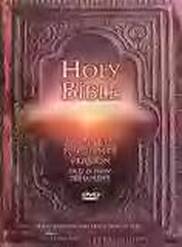Acts 4:23-37
Lesson 226
Read both the "King James Bible" and the "New Living Translation."
In this lesson:
What happened after Peter and John were released from prison?
Byzantine icon of Barnabas.
Who were -
Herod -
Herod Antipas was the son of Herod the Great (who tried to kill the infant Jesus in Matthew 2:16) and Malthrace. Ambitious, self-destructive, and without principles, the Romans appointed Herod tetrarch (ruler) over Galilee (Luke 3:1) and Perea after his father's death. Jesus called him a "fox" (Luke 13:32) because of his reputation for being sly, cunning, cowardly, and sordid. Herod had John the Baptist beheaded for criticizing his marriage to his niece and brother's ex-wife, Herodias (Matthew 14:3-12; Mark 6:17-18; Luke 9:9). At the time, Herod was at war with Aretas, the Arabian king of Petraea, for divorcing Aretas' daughter so he could marry Herodias. After Jesus' arrest, He was brought before Herod and mocked (Luke 23:6-12). Herod was eventually dethroned by the Romans for "confederating with the king of Parthia against the Roman empire." Herod and his niece/wife, Herodias, died in exile in Spain.
Barnabas -
Barnabas ("the son of consolation" or "the encourager") is a nickname for Joses (Joseph). Barnabas was Jewish, a Levite from Cyprus (Acts 4:36), John Mark's cousin (Colossians 4:10), and an important early Christian. When the apostles doubted the sincerity of Paul's conversion and feared him because of his earlier persecution, it was Barnabas who convinced them that Paul's faith was genuine (Acts 9:26-27). "A good man, and full of the Holy Ghost and of faith" (Acts 11:24), Barnabas sold his land and donated the proceeds to the church (Acts 4:37). Barnabas and his cousin John Mark traveled with Paul on his first missionary journey. A rift developed between Barnabas and Paul (Acts 15:36-41) when Mark left the mission early and returned to Jerusalem (Acts 13:13). Barnabas and Mark then traveled to Cyprus without Paul (Acts 15:39). Mark and Barnabas eventually reconciled with Paul, and Barnabas worked with Paul for a year in Antioch, teaching and building the church (Acts 11:25-26). When a famine struck the Roman empire, Barnabas helped Paul bring "relief" to Judea (Acts 11:29-30).
Herod -
Herod Antipas was the son of Herod the Great (who tried to kill the infant Jesus in Matthew 2:16) and Malthrace. Ambitious, self-destructive, and without principles, the Romans appointed Herod tetrarch (ruler) over Galilee (Luke 3:1) and Perea after his father's death. Jesus called him a "fox" (Luke 13:32) because of his reputation for being sly, cunning, cowardly, and sordid. Herod had John the Baptist beheaded for criticizing his marriage to his niece and brother's ex-wife, Herodias (Matthew 14:3-12; Mark 6:17-18; Luke 9:9). At the time, Herod was at war with Aretas, the Arabian king of Petraea, for divorcing Aretas' daughter so he could marry Herodias. After Jesus' arrest, He was brought before Herod and mocked (Luke 23:6-12). Herod was eventually dethroned by the Romans for "confederating with the king of Parthia against the Roman empire." Herod and his niece/wife, Herodias, died in exile in Spain.
Barnabas -
Barnabas ("the son of consolation" or "the encourager") is a nickname for Joses (Joseph). Barnabas was Jewish, a Levite from Cyprus (Acts 4:36), John Mark's cousin (Colossians 4:10), and an important early Christian. When the apostles doubted the sincerity of Paul's conversion and feared him because of his earlier persecution, it was Barnabas who convinced them that Paul's faith was genuine (Acts 9:26-27). "A good man, and full of the Holy Ghost and of faith" (Acts 11:24), Barnabas sold his land and donated the proceeds to the church (Acts 4:37). Barnabas and his cousin John Mark traveled with Paul on his first missionary journey. A rift developed between Barnabas and Paul (Acts 15:36-41) when Mark left the mission early and returned to Jerusalem (Acts 13:13). Barnabas and Mark then traveled to Cyprus without Paul (Acts 15:39). Mark and Barnabas eventually reconciled with Paul, and Barnabas worked with Paul for a year in Antioch, teaching and building the church (Acts 11:25-26). When a famine struck the Roman empire, Barnabas helped Paul bring "relief" to Judea (Acts 11:29-30).
Study Tip:
Before starting each study session, take a few minutes and ask God to open your heart to His teachings.
Before starting each study session, take a few minutes and ask God to open your heart to His teachings.



